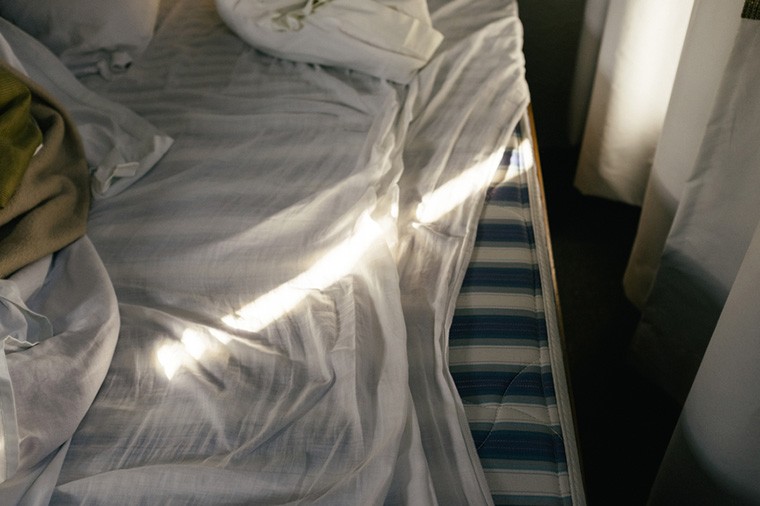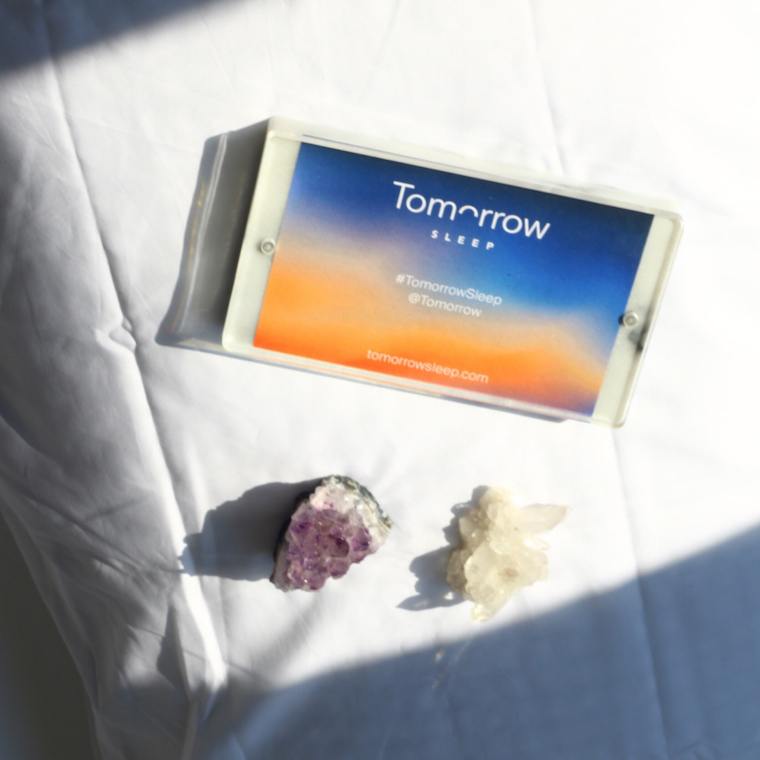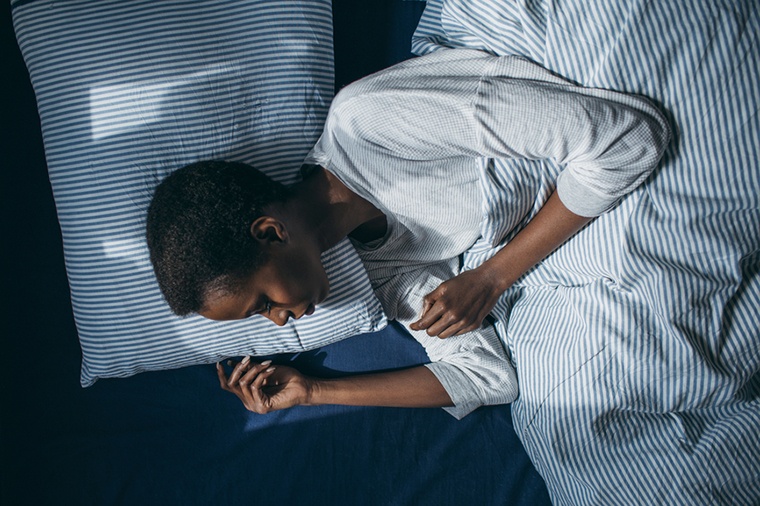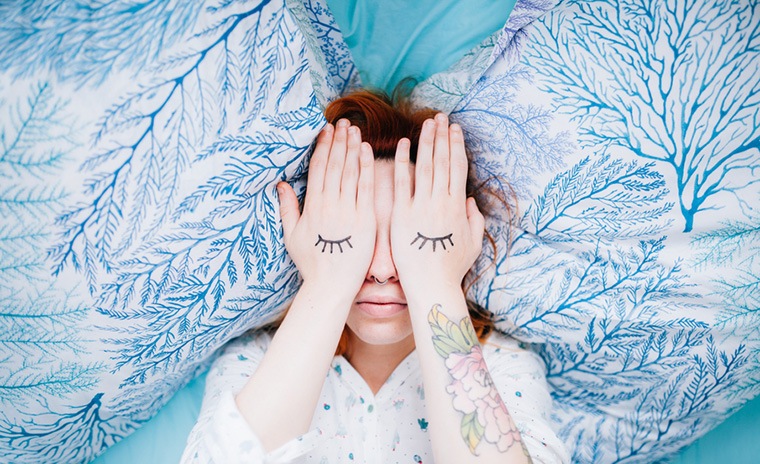The Plus Factor: This Is What the Future of Sleep Looks Like
This week on The Plus Factor, we’re talking about what the future of sleep looks like—from wearables to smart bedding and even performance-enhancing pajamas.
It's something everyone wants, but out of reach for millions. I'm not talking a Peloton bike, tricked-out Lululemon bra, or beauty cleanser glistening with actual crystals. In fact, despite being unattainable for so many, it's 100 percent free. What is it? Sleep.
Sleep has become so covetable, it's almost fetishized. Dreamy bedroom photos of fluffy duvets have replaced Instagram posts of wild nights out. Hard-to-pronounce Danish words have become trends. When someone says they slept a full eight hours, it comes across almost like a brag. Aren't you jealous?
It's something on everyone's mind—whether they're lucky to have it consistently or are up in the middle of the night wondering how to get it—but lately, wellness movers-and-shakers have been giving it extra thought. From Silicon Valley startups like Casper to biohacking savant Dave Asprey, some of the biggest innovations these days are a snore (that's a good thing). Wearables monitor your REM cycles, mattresses can pick up on whether that late-night snack is messing with your zzz's, and even pajamas are being developed to help you maximize every moment you're not awake.
"Everything about your health is bettered when you have good sleep or deteriorates when you have bad sleep."
In this stressed-out, adrenal-fatigued era, these bedside changes could revolutionize well-being (just ask Arianna Huffington). "Everything about your health is bettered when you have good sleep or deteriorates when you have bad sleep," says Asprey. "In the future, we're going to turn our bedrooms into sleep caves."

{{post.sponsorText}}
So, what will one find in these restful caves? Will Apple watches that tell you when to go to bed be the norm? Or will tech be banished from the bedroom all together, replaced with crystals and salt lamps?
Here, influencers entrenched in the sleep space sound off on what they envision the future looking like. Pour yourself a night smoothie and keep reading to see what they have to say.
Here's what the future of sleep looks like.

The world will be a little darker—and that's a good thing
"I've doubled the amount of deep sleep I get without changing the total amount of time [in bed] by controlling light exposure," biohacker Dave Asprey boasts. (And this from a guy who drinks butter-laced coffee all day.)
The link between screen time and trouble sleeping has been making (light)waves for years—but Asprey says electronics aren't the only culprit. "There are fluorescent or LED fixtures everywhere putting out too much light," he explains. In fact, the biohacker feels so strongly that the future is dim, so to speak, that he's the primary investor in TrueDark, which makes patented optical filters. He sees blue light blockers becoming a standard component for eyewear.
Asprey also predicts that our bulbs will change too, something he's already put into action in the Bulletproof headquarters and cafes. "There's a big light box around the door and it's red in the morning, then turns violet, amber, and then red again at night." As he explains it, different colors send messages to your cells about what time it is and if you send the wrong signal—AKA exposing yourself to bright light at night—the cells die faster. "Controlling light is the key to sleep," Asprey succinctly says.
Behavior sleep expert Shelby Harris, Psy.D, C.BSM agrees. "I think more and more electronics will have automatic blue-blocking filters that will come on at least one to two hours before bedtime," she says. "Tech is going to be used for everything from ensuring our mattress is the perfect temperature to limiting outdoor noise and light exposure." (And you thought memory foam was fancy.)
Oh, and then there's the potential to manipulate light to optimize brain plasticity, which is what podiatrist and human movement specialist (not to mention avowed biohacker) Emily Splichal, MD predicts. In the future, she sees people using light and sound in new ways as a shortcut to recovery mode, turning brain waves down faster. "Since the brain is linked to emotions—which are linked to inflammation, which [in turn] is linked to aging—this is powerful," she says. Lights off, indeed.

Tracking sleep will replace tracking steps
"What's funny is that companies are creating tech products to help with sleep problems—a dilemma that was created by tech in the first place," says Theresa Fisher, the editor at Casper's editorial content vertical, Van Winkle's. Still, she (along with virtually every other expert interviewed for this story) doesn't see tech being banished from the bedroom anytime soon.
In fact, gadgets are quickly becoming a wellness it-accessory, with apps, watches, and bedside monitors vying for the attention of the tech-obsessed. FitBit, Jawbone, and Apple all have sleep-tracking features on various watch models, while other companies like ResMed and EmFit are thinking beyond the wearable with sensory devices that work with your mattress or voice (and then transmit the information to your phone via an app).
"People are going to have more data about their sleep habits than ever before, and they're going to use that information to hack their sleep, figuring out exactly what their problems are and how to fix them," Fisher says. Bryan Murphy, the founder and president of Tomorrow Sleep sees a similar future. The buzzy Serta Simmons Bedding-backed startup recently came out with an electronic sensor—turning any mattress into a "smart mattress"—that not only tracks how long you doze, but also how much time you spend in each phase of sleep. "Then, you get a personalized report of what you can do to maximize your sleep," he says. (It may suggest you stop eating so close to bedtime, for example.)
"What's exciting about the future of sleep is that people will be able to pinpoint the reasons why they aren't sleeping, and then they'll be able to do something about it," Murphy says. "Right now, most people know they aren't sleeping well, they just don't know why."

Your bedding will be anything but basic
Expect your bedding to smarten up, too. Tomorrow Sleep already has a bedding and duvet line—tested on "sweat dummies", natch—ensuring you'll stay cool while bundled up. (Anyone who has tried to sleep on a hot, air conditioner-less summer night knows the important role body temperature plays on getting a restful eight hours.)
Also getting a tech-y touch? Your PJs. Under Armour is leading the charge by inventing a whole new category of clothing: recovery sleepwear. According to the brand's senior director Jasmine Maietta, the line—created in collaboration with Tom Brady's TB12 wellness company—was inspired by the football player's commitment to prioritizing sleep to enhance his athletic performance.
"The pattern [on the pajamas] includes special bioceramic particles that absorb the body’s natural heat and reflect back far infrared energy, helping your muscles to [repair] faster and enhance sleep," she explains. In other words, if you're too busy to foam roll during your waking hours, you can make up for it as you doze.

Ambien will be passe
Today, Ambien is about as common as Advil, but certified hypnotist and life coach Alexandra Janelli is seeing an increasing demand for alternative ways to treat sleepless nights. Her wellness center Modrn Sanctuary features crystal light beds, halotherapy, and shamanism, among other services. "People are beginning to see these alternative treatment as tools for sleep and accepting them similarly to how acupuncture used to be thought of as 'out there' but is now mainstream," she says.
The crystal bed in particular has become a much talked-about treatment. "It uses a lot of quantum, metaphysical science," Janelli explains. "It has vibrational beats, color therapy, and infrared heat. So even if you aren't buying into the crystals, one of its other features might work for you. People are seeing results." And for the not-quite-believers, there's always kava.
And there's another way that the mainstreaming of woo-woo wellness overlaps with sleep innovation: lucid dreaming—AKA being aware you're dreaming and able to control what's happening, to some extent. "There's an interest around hacking your sleep and using it for memory or to become more creative," says Fischer, who, through her work at Casper, has noticed a growing curiosity around the esoteric modality. "Lucid dreaming or using scents and sounds to enhance certain memories while suppressing harmful ones is something people will be doing more."

Your boss will ask you about your sleeping habits
People aren't just falling asleep at home. If you work for a tech giant like Google or Arianna Huffington's Thrive Global, you already have access to sleep pods. And the fact that LinkedIn has an official sleep and wellness expert, Michael Susi, speaks volumes (or, more apt here, whispers) to how sleep will play into the workplace.
"Now and into the future, I anticipate that we'll see more companies worldwide integrating employee wellness into their everyday culture. Sleep is a significant factor for someone's overall well-being, and employees are a company's greatest asset," Susi says. In other words: It pays for your co-workers to be well-rested.
In France, it's already against the law to email after work hours, and stateside Aetna's literally paying its employees to clock quality bed time, giving employees $25 for every 20 nights they report sleeping seven hours or more. Who would better know the positive impact sleep has on health than an insurance giant?
Whatever predictions will come true, it's clear the lust for sleep-filled nights isn't going away anytime soon. And as experts figure out more ways to hit the pillow smarter, it will only allow for even more time to dream up what's next.
While you're waiting for the future, here are eight foods that will help you doze off and seven easy habits to work into your routine.
Loading More Posts...